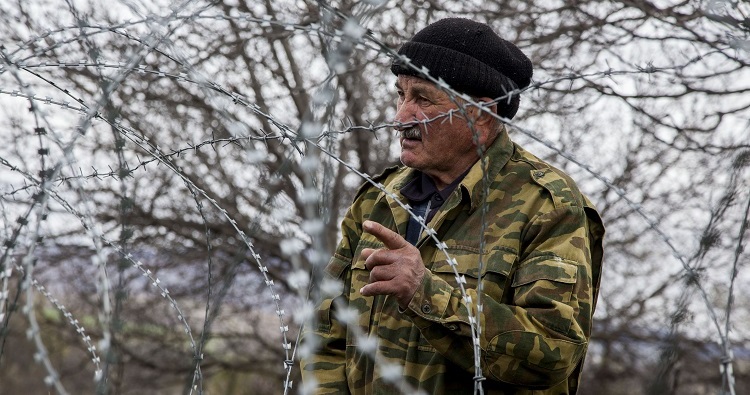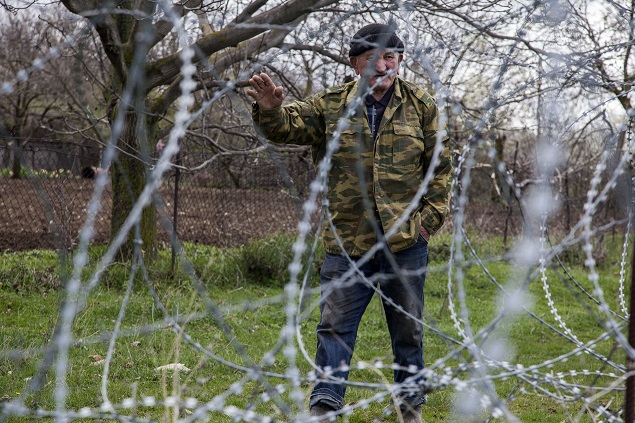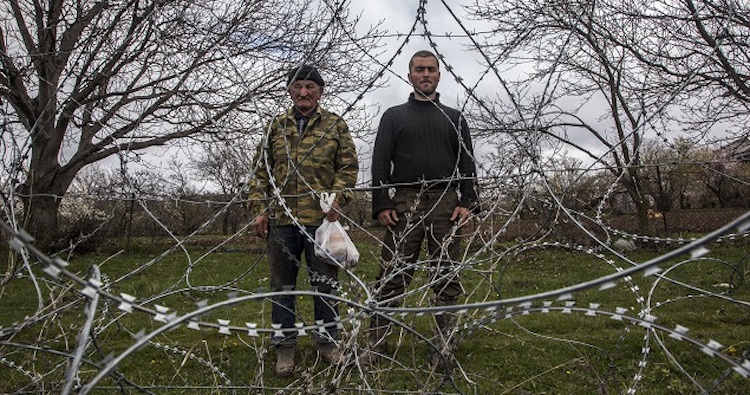Symbol of difficulties of Russian occupation Davit Vanishvili dies in home behind barbed wire fence

Back in 2013 Data Papa woke up to find that a barbed wire fence installed by Russian border guards had cut his house off from the rest of Georgia. Photo: Nino Alavidze/Agenda.ge.
Davit Vanishvili, also known as Data Papa, who has lived for about eight years isolated on the other side of the Administrative Boundary Line (ABL) in the Russian-occupied Georgian village of Khurvaleti, has died.
Data Papa has become a symbol of Russian occupation in Georgia because of his story of being isolated from the rest of Khurvaleti village by a barbed wire fence.
Back in 2011 Data Papa woke up to find that a barbed wire fence installed by Russian border guards had cut his house off from the rest of Georgia.
Not only the house but the agricultural land, his wheat fields, which formerly was his means of generating an income, were behind the barbed wire fence.
Do not leave the house, do not go anywhere, sit by the stove, Georgians will help you", these were the last words of Data Papa to his wife, Valia, according to Radio Free Europe/Radio Liberty.
Radio Free Europe/Radio Liberty reports that the occupation forces allowed Data Papa's daughter Nana Vanishvili, who lives in a neighbouring village, to cross the barbed wire fences and mourn her father today.
She said that her father was ill in recent months and could not get out of bed.
She said that Data Vanishvili will be buried next to his parents in an occupied cemetery.
Data Papa was well-known for his activities against the occupation. He always spoke out loudly about the injustice and was not afraid of the Russian occupiers.
 Data Vanishvili was not allowed to cross this barbed wire fence. If he did, he would be arrested. Photo by Nino Alavidze/Agenda.ge.
Data Vanishvili was not allowed to cross this barbed wire fence. If he did, he would be arrested. Photo by Nino Alavidze/Agenda.ge.
Data Vanishvili was repeatedly offered to receive the citizenship of the so-called South Ossetia and to take a pension there, but he could not get used to the occupation and did not renounce his Georgian citizenship.
He was arrested several times for crossing the so-called border and moving to an unoccupied part of Khurvaleti, but despite this he was constantly coming to vote in the elections held in Georgia.
Last year his son Malkhaz Vanishvil was illegally detained by the occupying forces and was taken to occupied Tskhinvali.
In 2015 Agenda.ge’s photographer Nino Alavidze and a political editor Lali Tsertsvadze visited Khurvaleti and spent Easter with the people who live there and are affected heavily by the barbed wire fences.
At Easter the Khurvaleti neighbourhood and the Vanishvili family used to gather on both sides of the barbed wire fence. Because of the barbed wire fence which acts as an artificial border in Khurvaleti and nearby villages, locals are now unable to visit cemeteries and roll an Easter egg on the graves of their beloved. But the Vanishvili family helped the villagers to pay their respects by taking Easter eggs, traditional Easter bread called Paska and candles to each grave at the cemetery.
Khurvaleti now borders Tskhinvali region (South Ossetia), one of Georgia’s two breakaway regions, which was the epicenter of the short but deadly Russia-Georgia war in August 2008.
 Data Vanishvili and his son, Malkhaz Vanishvili. Photo: Nino Alavidze/Agenda.ge.
Data Vanishvili and his son, Malkhaz Vanishvili. Photo: Nino Alavidze/Agenda.ge.
After the war, Russian border guards set a new ABL between Georgia and its breakaway region, erected barbed wire fence along this arbitrary line through Georgian villages and announced it was the new ‘state border’.
Then and now, any attempt Georgian villagers make to cross the barbed wire fence is treated as ‘violating the state border’ and the ‘offenders’ are arrested and taken to Tskhinvali prison. Moscow calls this ‘border security’ while Tbilisi and the rest of the world call it ‘creeping occupation’ of Georgian land.
 Tweet
Tweet  Share
Share